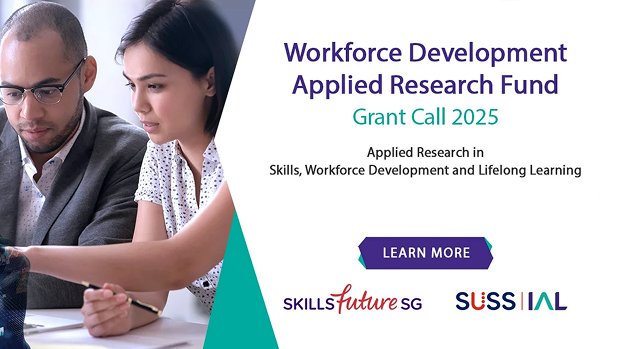The Workforce Development Applied Research Fund (WDARF), a national-level research fund offered by the SkillsFuture Singapore (SSG), aims to foster high quality and rigorous applied research in workforce development and lifelong learning to support the SkillsFuture Singapore's key thrusts and national-level policies. It encourages inter-disciplinary research and seeks to strengthen research capabilities, through leveraging both local and international expertise. The WDARF Grant Call is administered by the Institute for Adult Learning (IAL) on behalf of the SkillsFuture Singapore (SSG). The grant is awarded through an open, competitive bidding approach, where submitted proposals go through a technical expert review and evaluation, before they are presented to a Research Committee for approval.

Workforce Development Applied Research Fund (WDARF) 2025 Grant Call
The WDARF 2025 Grant Call is now closed for Expression of Interest (EOI) submission.
Previous Result
Grant Call 2024
Advance through productive failure with the ADVANCE (Adult Development and Virtual Autonomous Nurturing Collaborative Educator) AI agent
Dr Rosmawati, Singapore Institute of Technology
This project aims to improve CET through the integration of generative AI and its synergy with effective pedagogical underpinnings (i.e., productive failure (PF) and scenario-based learning (SBL)). This project will demonstrate how a customizable GenAI agent (named ADVANCE – Adult Development and Virtual Autonomous Nurturing Collaborative Educator) is a befitting platform to allow learners to engage in autonomous, personalized learning experiences and learn through failures. The ADVANCE will be designed according to scenario-based learning and generate role-play case studies, provide feedback and guidance on the learners' judgments and action, and produce self-assessment questions, hence enabling adult learners to engage in complex problem solving and learn through failures along the way.


Grant Call 2024
The power of we: Using group-based methods to empower skills training participation and performance among lower-wage workers
Dr Laurel Teo, National University of Singapore
This objective of this project is to develop and test novel intervention formats built on group processes, to enhance skills training participation and performance among lower-wage workers. The project aims to explore the extent to which such group-based training formats are more effective than traditional, individual-based skills training formats. These group-based formats will be informed by established relevant theories in the field, covering on existing research in planned behaviour, social class, and self-management.


Grant Call 2024
An exploratory investigation of persons with disabilities’ workforce and CET participation
Assoc Prof Sandy Lim Geok Peng, National University of Singapore
The overarching objective of this research is to develop a comprehensive understanding of PWDs’ workforce participation and engagement with continuing education and training (CET).


Grant Call 2023
Understanding the experience of low-wage workers: Challenges in lifelong learning participation
Assoc Prof. HO Moon-Ho, Nanyang Technological University
This project aims to understand the impact of psychosocial and institutional factors on the pursuit of lifelong learning among low-wage workers. Furthermore, our aim is to investigate the challenges low-wage workers face in developing and applying transferrable skills in both work and life. The results can be used to refine and develop policy, scheme, or pedagogy that caters to the needs of the low-wage working population and helps them engage better in learning, particularly the transferable skills.


Grant Call 2023
Modelling Self-Regulated Online Learning: Video- and Game-Based Learning
Associate Professor Goh Yang Miang, National University of Singapore
This project aims to answer the following research questions:
1. How can learning analytics be used to identify online learners’ SRL subprocesses during video-based learning (VBL) and DGBL?
2. What patterns of SRL subprocesses do online learners undergo during VBL and DGBL?
3. How do the patterns of SRL subprocesses differ between high- and low-performers?
Deliverables:
a. Open-source dataset and machine learning model
b. Intervention strategies for low performers



